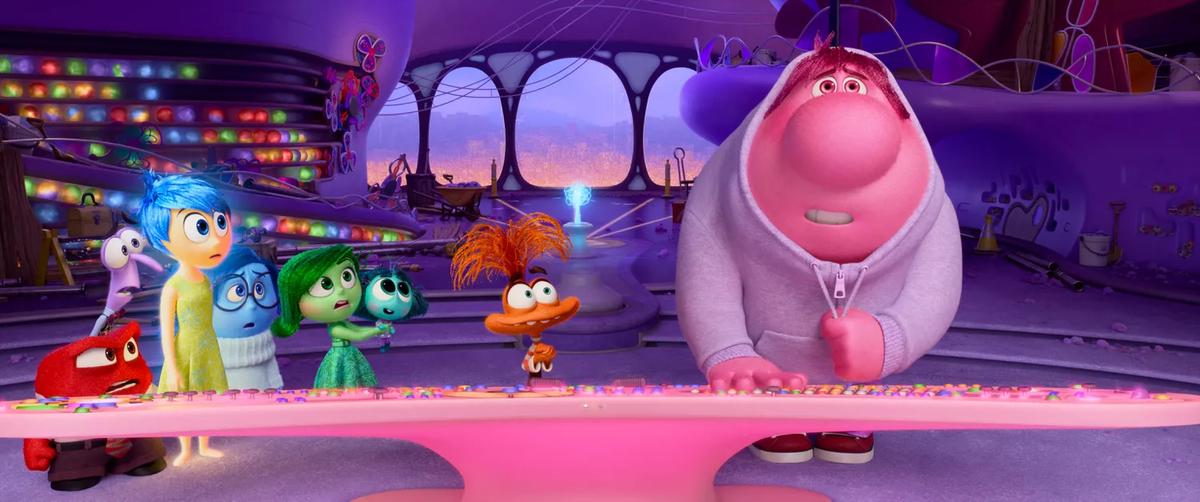Emotions

Meet the New Emotions Kids Will Learn About in 'Inside Out 2'Do you know what Ennui is? Neither did we—but it may be one of the most important emotions your kids feel.
|
Anxiety is one of the newest and more “sophisticated” emotions joining the gang. But since Riley is entering her teen years, Envy, Embarrassment, and Ennui arrive too, and start wreaking even more havoc. Joy, Sadness, Fear, Anger, and Disgust are aghast that these new emotions take over as Riley deals with complicated growing pains and all the insecurities that go along with it—especially when it comes to friendships, appearance, and social status.
We went to the experts to dig deeper into the nuances of Anxiety, Envy, Embarrassment, and Ennui (with an emphasis on Ennui—since you may not be familiar with that one).
"Tweens and teens begin to develop more complex relationships and, developmentally, they begin to develop more abstract thinking and reasoning skills,” explains Kara Kushnir, MSW, the founder of A Work of Heart Counseling (AWOH). “This leads to increased curiosity about peers and themselves. As a result, anxiety can peak around how others perceive them, embarrassment can emerge from those same scenarios, and teens are more likely to feel envious or ennui when comparing themselves to their peers.”
The beauty of Inside Out is as entertaining as it is for kids, it’s a great primer for parents so we’re prepared and not blindsided—while reminding us that we’re not alone!
Why 'New' Emotions Emerge in the Teen Years
When children are younger, their emotions are often more on display or easier to decipher by their actions. They’ll lose a favorite toy and start crying—so you know they’re sad. Or they become clingy after a bad dream so it’s obvious that they’re scared.
“But as children get older, they’re better at managing their emotions, which means concealing them depending on the situation,” explains Janna Kook, MS, PhD, a research scientist at the Education Development Center (EDC). “Their experiences of hopes, fears, and losses also become more complicated and mixed. For example, spending time with peers can feel more exciting and more stressful at the same time. These complex feelings are not as easy to name anymore.”
While Kook says kids can also feel some of these emotions, older kids and teens are more likely to experience scenarios that are relationally more complicated and, thus, lead to more nuanced emotional experiences.
Those emotional experiences sometimes can lead to mental health issues, something teens are increasingly facing. In fact, in 2021, 42% of high school students felt sad or hopeless and about 29% experienced poor mental health.1
“Adolescence is also a time period where mental health conditions begin to emerge for many individuals, and thus their emotional variability and lability can increase as a result of this,” adds Kushnir. “Emotional identification and regulation can be protective and supportive of a teen navigating a diagnosis and learning tools to cope if this does happen.”
Naming the New Emotions
Having new vocabulary for these feelings makes it easier for tweens and teens to talk about them while making them seem less scary and more manageable. We asked Lyssa Haase, PsyD, a pediatric psychologist at Intermountain Primary Children’s Hospital to help us break down exactly what each of the new emotions named in Inside Out 2 mean and how to explain them to your kids.
Anxiety
DISNEY/PIXAR
Think of anxiety as your brain's built-in alarm system. It's there to keep you safe, like a smoke detector that goes off when you burn toast.
“But sometimes, the alarm gets a little too eager and starts blaring for no reason,” says Dr. Haase. “For preteens, this false alarm can be triggered by a number of things: that upcoming math test, fitting in with the cool crowd, or even a big pimple on their nose.”
Embarrassment
DISNEY/PIXAR
Think of embarrassment as your brain's internal alarm system for social situations, where you have the urge to crawl under a rock and hide until the coast is clear.
“Preteens are developing a stronger sense of self, and are becoming more aware of how others perceive them, which can trigger embarrassment when they feel they've fallen short of those expectations,” explains Dr. Haase.
Envy
This is the emotion that makes us want what someone else has, though it is not just about material possessions or grades. “
The key point is, your child sees something desirable in another person, and it makes them wish they had it too,” says Dr. Haase. “Examples can include height, sense of humor, or artistic or musical talents.”
Ennui
This is the one that has everyone asking: what is Ennui? You may not be familiar with the name of this emotion, but you’ve definitely watched your child (no matter the age) go through some form of it. In layman's terms—ennui is a feeling of boredom, dissatisfaction, and a general lack of energy or interest in things.
“It's that ‘blah’ feeling that makes even the coolest video game or the most hyped movie seem boring,” says Dr. Haase. “Think of it like your preteen's internal battery is running low; they want to have fun and engage with the world, but they just cannot muster the excitement.”
In tweens/teens, Kook says Ennui can also be a “catch-all” for other emotions.
“For example, a child who is feeling anxious might not be able to identify it and instead will complain they’re bored,” Kook explains. “But, it could be that their anxiety is blocking their ability to focus on an activity or find something they enjoy.”
Parents should beware that the use of screens can often feed into feelings of ennui. “Boredom can be a helpful cue that we need a change of scenery, someone to talk to, or a new activity to get engaged in. If a teen is feeling bored, they might resort to scrolling on a phone,” says Kook. “But that kind of passive consumption of media can be addictive and make teens even less motivated to engage with the outside world.”
Helping teens make healthy boundaries around screen time is important for helping them face complex emotions and deal with them productively.
Tips for Managing These New Emotions
Pre-teens and teens need help talking through complex feelings with trusted adults. This is extremely important for learning to manage their feelings and make sense of their experiences. It can be just as uncomfortable and “new” for parents as it is for their kids.
“Parents might try to make those feelings go away as quickly as possible,” explains Kook. “Notice your own reaction to your child’s emotions and what feelings they bring up for you. It’s normal for parents to be tempted to start problem-solving too quickly, be overly reassuring or minimizing—saying things like, ‘It’s fine, no one is paying attention to what you’re wearing anyways!’—but doing so could inadvertently communicate to your child that you don’t want to hear about their feelings, or that their emotions are too overwhelming.”
These are complex emotions so they don’t have simple fixes. The goal is not to make the feelings go away but for everyone to be aware of them and learn to live with them. Kook suggests asking questions as non-judgmentally as possible to understand why your child might be having such big feelings, and discover what is most important to them.
“Give space for them to answer and try to say back what you’re hearing—such as, ‘It sounds like you’re feeling really anxious about the try-outs. Being a part of this team is really important to you. Is that right?’” says Kook. “Once your child has a chance to express themselves and feels understood, that might be enough to move on. But if there is a problem to solve, try to support them in thinking about solutions with questions such as ‘What do you think would help you feel better?’”
Watching 'Inside Out' As A Family
Parents can use Inside Out as a vehicle for helping their family start meaningful conversations about how everyone is feeling.
“We know from research on children’s media that watching shows and movies together can be a great opportunity for opening up conversation between parents and kids, especially about topics that might otherwise be hard to talk about,” says Kook.
Most kids aren’t naturally inclined to bring up conversations about their feelings and many parents struggle with bringing that out. Think about how often you ask your child “How was school today?”, and what kind of a response you usually get!
“Talking about someone else’s feelings, like the character Riley, is easier than talking about your own, so it can be a good entry point for conversation,” explains Kook. “Humor is also a great way to help everyone feel relaxed and lighten the mood around a heavy topic.”
But, after watching the movies, don't expect to know how to “fix” how your kids are feeling. “In fact, that may be very unhelpful,” says Kushnir. “But recognizing their emotion(s), communicating it back to them, and sharing gratitude for being let in—even a little bit—will go much farther!”


